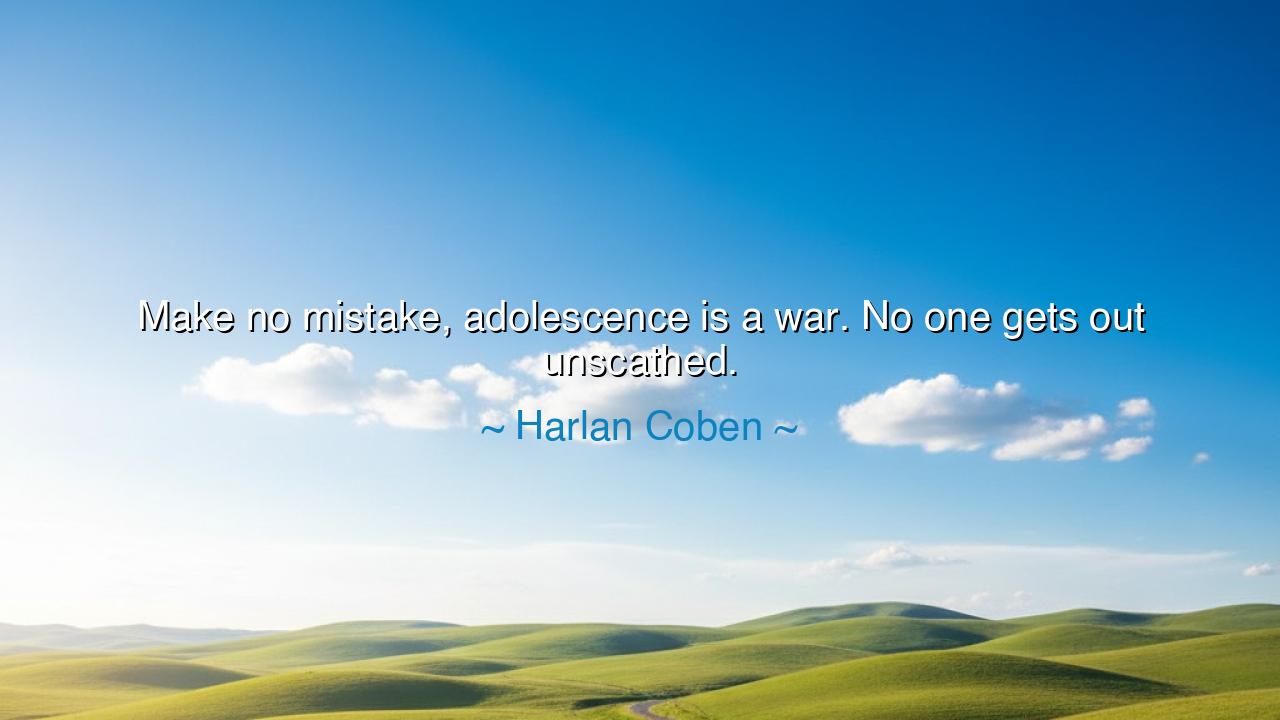
Make no mistake, adolescence is a war. No one gets out






The novelist Harlan Coben, who has peered deeply into the struggles of human lives, once declared: “Make no mistake, adolescence is a war. No one gets out unscathed.” In this striking metaphor, he names what every soul who has passed through youth knows in their heart—that the journey from child to adult is no peaceful walk, but a battlefield of identity, desire, fear, and discovery. The scars left by this war are invisible to the eye, yet they mark the spirit forever.
The origin of this saying lies not in politics or global conflicts, but in the personal wars waged within the hearts of the young. Coben, writing stories that often explore hidden pains and family struggles, recognized that adolescence is itself a crucible. In this time, the self is torn between innocence and responsibility, between dependence and independence. It is a clash of armies within: the longing to belong and the hunger to be free, the yearning for approval and the rebellion against authority.
History is filled with examples that illuminate this truth. Consider the story of Anne Frank, a girl thrust into adolescence while hiding in a secret annex during World War II. Her diary reveals the battles of her heart: her longing for love, her quarrels with her family, her questions about identity and future—all while facing mortal danger. Her words remind us that adolescence itself is already a war, even when magnified by the external wars of the world. She did not emerge unscathed, yet her spirit lives on, showing the strength forged in struggle.
Even in times of peace, the struggle is fierce. Every culture tells stories of young men and women tested by trials before they step into adulthood. The Spartans of ancient Greece cast their boys into rigorous training, demanding they master fear, hunger, and pain before they could call themselves warriors. In modern times, the “training” takes other forms—peer pressure, heartbreak, failure in school, rejection, and doubt. These are not battles fought with swords, yet they leave wounds as real as any.
The meaning of Coben’s words is also compassionate. By calling adolescence a war, he teaches us not to dismiss the struggles of the young as trivial. To a boy who feels the weight of rejection, to a girl who wrestles with self-image, these are not small matters—they are battles of life and death within the soul. No one emerges untouched, for all carry scars: insecurities, regrets, or lessons learned painfully. To see this truth is to be gentle, patient, and understanding toward those still in the midst of their battles.
For us, the lesson is clear: do not be ashamed of your scars. They are the marks of battles fought and endured. Every person carries them—some deeper, some lighter—but all are reminders that they survived the war of becoming themselves. And for those guiding the young—parents, teachers, mentors—the task is not to shield them from every wound, but to help them endure, to give them armor of love, and to remind them that scars can become symbols of strength.
Therefore, let this wisdom endure: adolescence is indeed a war, but one that forges character, resilience, and wisdom. The wounds it leaves can either weaken or strengthen, depending on how they are faced. Walk through this battlefield with courage, and emerge knowing that even though none escape unscathed, those who endure with humility and love can turn their scars into sources of compassion and strength for others. For it is in surviving this hidden war that each generation earns its place in the great story of humanity.






GHpham nguyen gia hung
Coben’s quote makes me think about the emotional toll adolescence takes. It's a time of discovering who you are, and that can be tough, with societal expectations and family dynamics often complicating things. But do we have to accept that ‘no one gets out unscathed’? Could there be a way to support teens better so that their emotional ‘battle’ is less about surviving trauma and more about navigating growth and learning?
??
I can relate to Coben’s idea that adolescence is a war, with so many pressures and challenges to navigate. However, I wonder if we sometimes exaggerate the struggle by labeling it as a ‘war.’ Can’t we find a more positive way to frame growing up, focusing on resilience and learning rather than war? How do we help young people face the difficulties of adolescence without making them feel like they’re always in combat mode?
HGHuy Hoang Gia
Coben’s quote captures a very real part of growing up—how adolescence can feel like an endless series of battles. I think about how social media, school pressures, and family expectations amplify these struggles. But is the ‘war’ view of adolescence harmful, or does it simply acknowledge the reality of how difficult those years can be? How do we balance helping teens grow with protecting them from unnecessary hardships that can leave lasting scars?
PDPham Duong
This quote from Coben makes me reflect on the internal and external struggles teens face during adolescence. It’s a time of self-discovery, but also a period where identity is often tested by external pressures. I agree that adolescence is challenging, but I wonder, is it necessary for every teen to ‘get scarred’ in some way? Shouldn’t we strive for a healthier environment where teens can grow without feeling like they’re fighting a battle?
THTuan Hieu
Coben’s quote about adolescence being a war resonates with me, especially when I think about the emotional and psychological battles that many teens face. It’s not just about physical changes but also dealing with identity, peer pressure, and family expectations. Is this the right way to view adolescence, though? Shouldn’t we be more supportive of young people instead of framing their journey as a battle? Or is this just a way to acknowledge the real struggles of growing up?